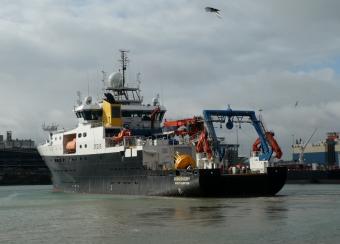The National Oceanography Centre’s (NOC) Royal Research Ship Discovery left Southampton, on 25 March 2021, for an expedition to the Porcupine Abyssal Plain Sustained Observatory (PAP-SO).
Led by Dr Sue Hartman, the expedition will extend a 36-year long observation at the PAP-SO that dates back to 1985. The observation is critical to understanding long-term changes in the oceans.
The science and technical teams onboard will carry out a range of water column and seafloor sampling data collection operations. Additionally, they will continue the long-term measurements of sedimentation events and water currents within the Whittard Canyon, a major submarine canyon system within a geological feature that hosts England’s only deep-sea marine protected area.
The team will service a UK Met Office buoy that monitors Atlantic weather for wind speed and direction, relative humidity, air and sea temperatures, atmospheric pressure, sunlight, atmospheric CO2, wave height and period. This five-kilometre-deep ocean mooring is also equipped with NOC oceanographic sensors that test for salinity, temperature, CO2, O2, ocean acidity, phytoplankton pigments, nutrients, and sunlight. These measurements will be used to study natural variability in the ocean.
A second PAP-SO mooring carries a series of sediment traps that monitor seasonal variations in the sinking particles that carry carbon from the surface ocean to the deep-sea floor. The oceanic uptake of CO2 reduces atmospheric levels of this greenhouse gas. Following this carbon, from the surface to ocean depths, will show how much carbon is locked away under the sea.
In addition to extensive water column and seafloor sediment sampling, the team will use a remotely operated vehicle (ROV) to video and photograph the seafloor. The vehicle will document the presence of the particulate organic matter and larger wildlife that it feeds, such as sea cucumbers and sea anemones.
Dr Sue Hartman said: “This is an exciting expedition that extends a unique observation which the National Oceanography Centre has run for 36-years. The new observations and samples that we collect are needed to study the changing Atlantic Ocean and climate regulation and ocean services. The research will assess how the ocean and deep-sea eco-systems will evolve as a result of climate change and intensified human exploitation.”
The expedition is part of CLASS (Climate Linked Atlantic Sector Science), a five-year project funded by the Natural Environment Research Council. The project will be led by the National Oceanography Centre and is a collaboration with The Scottish Association for Marine Science, Plymouth Marine Laboratory, Marine Biological Association, and the Sea Mammal Research Unit, which will run between April 2018 and 2023.

